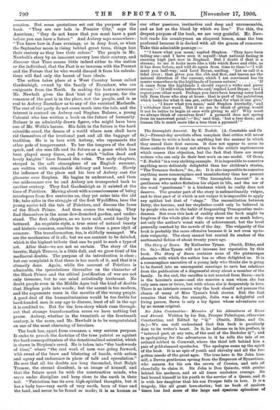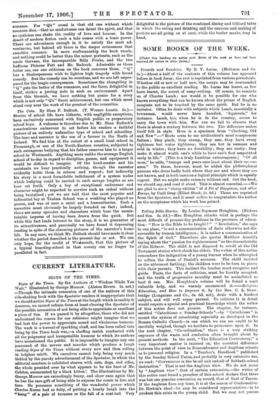Sir John Constantine : Memoirs of his Adventures at Home
and Abroad. Written by his Son, Prosper Paleologus, otherwise Constantine, and Edited by " Q." (Smith, Elder, and Co. 6s.)—We can well understand that this book is peculiarly dear to its writer's heart. In it he informs us in his preface, is "interred part, at any rate, of the soul of the Bachelor Q " ; and in apologising for the adventures in it he tells the tale of an orchard robbed in Cornwall, where the thief left behind him a . pair of gold-rimmed spectacles. The apologne sums up the spirit of the book. It is an epic of youth and chivalry and all the for- gotten creeds of the great ages. The true hero is Sir John him- self, a Devon gentleman sprung from the Emperors of Byzantium, who secures for his son the crown of Corsica, and sets Off cheerfully to claim it. Sir John is Don Quixote, with genius behind his madness, and at all times unshaken courage. He had bound himself in his youth to the service of a Queen, and it is with her daughter that his son Prosper falls in love. It is a tragedy, like all great love-stories; but no book of modern times has had more of the large and spacious splendour of
romance. For " Q's " creed is that old one without which romance dies,—that no misfortunes can daunt the spirit, and that no cynicism can shake the reality of love and honour. In the desert of modern fiction such a tale comes with a tonic power. There are adventures enough in it to satisfy the most ad- venturous, but behind all there is the deeper seriousness that ennobles romance. In mere craftsmanship the book excels, and nothing could be better than the minor portraits, such as the uncle Gervase, the incomparable Billy Priske, and the two buffoons Phineas Fat and Mr. Badcock. Admirable as these latter are, our one criticism on the book concerns them. " Q " has a Shakespearean wish to lighten high tragedy with broad comedy. But the comedy can be overdone, and we are left unpre- pared for the tragic consequences. Sometimes the changeling in " Q " gets the better of the romancer, and the farce, delightful in itself, strikes a jarring note in such an environment. Apart from this blemish, we have nothing but praise for a story which is not only "Q's" finest achievement, but one which must stand very near the work of the greatest of the romantics.



























































 Previous page
Previous page